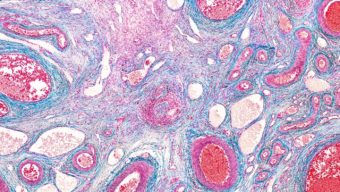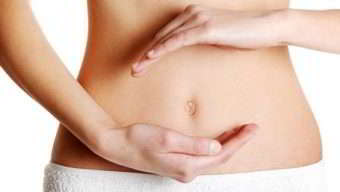
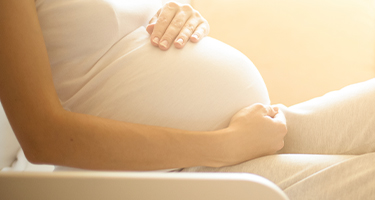
The aim of Intrauterine Insemination (IUI) is to respect the natural environment of the gametes as much as possible, thus favouring fertilisation. This technique consists of depositing a semen sample, which has been prepared in advance in the laboratory, inside the woman’s uterus in order to increase the potential of the spermatozoa and improve the chances of the egg being fertilised.
Intrauterine Insemination treatment (IUI treatment) is a type of fertility treatment that is less complex, minimally invasive, and often more affordable than other assisted conception methods. It involves inserting a prepared sperm sample—either from a male partner or a donor—directly into the uterus to increase the chances of a successful pregnancy. The sample is washed and processed in a laboratory to ensure only motile sperm capable of fertilising an egg are used. This treatment is often paired with fertility drugs to stimulate the ovaries and is precisely timed with ovulation for the best results. Full procedure details will be discussed during your initial appointment.
IUI treatment is typically recommended for individuals or couples with no major fertility complications, including single women or same-sex female couples using donor sperm. However, artificial insemination London can also be suitable for cases of unexplained infertility, or where initial fertility tests have shown promising results, as well as patients with ovulation disorders. As part of your personalised treatment plan, our expert team in reproductive medicine will determine if IUI is the right step on your fertility journey. Our experienced fertility specialists who offer IUI treatment in London will guide you through the available fertility services, expected outcomes, and the costs of treatment, supporting you on your path to parenthood.
Intrauterine insemination treatment (IUI treatment) is a less invasive and more cost-effective fertility treatment compared to in vitro fertilisation (IVF). It can be used as a first-line approach in couples with unexplained infertility, and also particularly for patients using donor sperm, same-sex female couples, and single women. With IUI, the fertilisation process happens naturally inside the body. In contrast, IVF allows for greater medical control, enabling fertilisation to be confirmed in the lab and the healthiest embryos to be selected for transfer. While IUI success rates are generally lower than IVF (typically around a third), it can still be highly effective depending on the cause of infertility. Success may be reduced if sperm quality is poor. IUI is usually recommended as a short treatment course, with three or more cycles often advised. These can be spaced out or completed consecutively, with studies suggesting that back-to-back cycles may improve the chances of pregnancy.
Single women
Heterosexual couples
Female same-sex couples
The typical IUI cycle fee is generally lower than that of IVF treatment, making it a more accessible option for some individuals and couples.
* Live birth rate (LBR) in patients < 35 years old. Based on 2018 data verified by the HFEA.

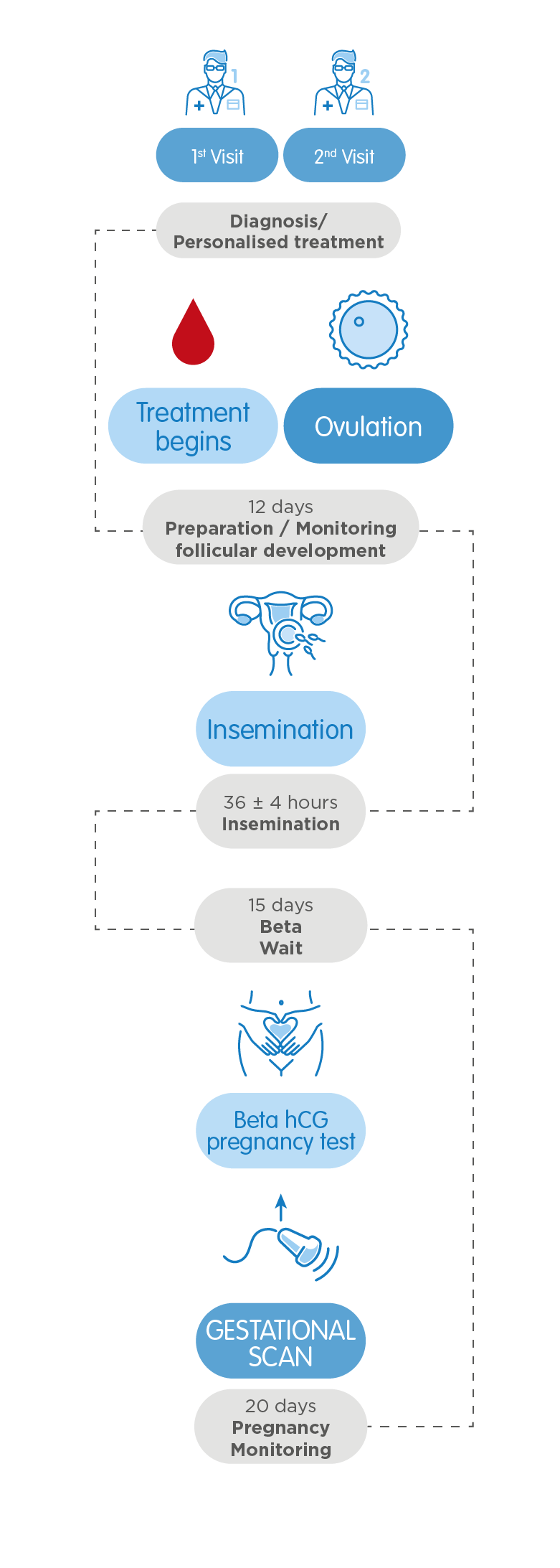

The treatment process starts at the beginning of the woman’s menstrual cycle, at which point ovarian stimulation begins. This lasts between 10 – 12 days.
Ovarian stimulation is optional; however, it can increase the chances of success. As women naturally produce only one egg per menstrual cycle, ovarian stimulation ensures one or two eggs develop. Your consultant will help you decide whether ovarian stimulation is recommended in your specific circumstances.
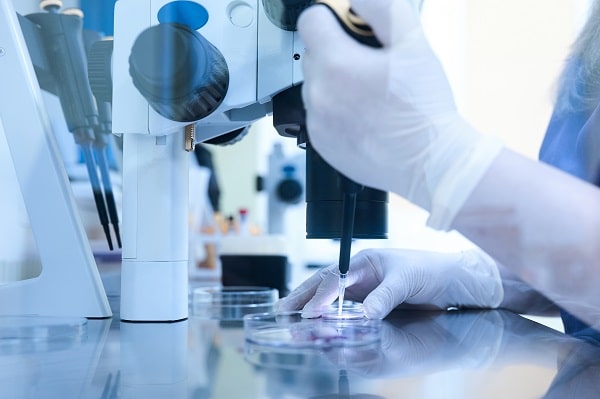
The ovulation cycle is carefully monitored using a series of ultrasound scans and blood tests. Once the follicles have reached the appropriate number and size, a hCG hormone trigger injection may be administered to induce ovulation. The insemination procedure is scheduled 36 hours later.
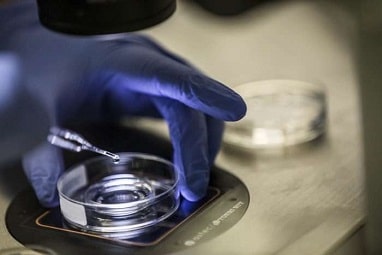
On the day of the insemination procedure, the sperm sample is prepared in the laboratory of your IVI clinic. If the male partner’s sperm is being used, the partner must deposit the sample to the clinic two hours before the procedure is scheduled to take place. This process allows our scientists to select and concentrate the spermatozoa with the best motility and remove immobile or slow-moving spermatozoa, optimising the quality of the sample and increasing the chances of fertilisation.

The insemination procedure is quick and painless. It is performed without sedation or any need for surgery. After inserting a speculum, the semen sample is introduced through a cannula into the uterus. Following the procedure, you will rest for a few minutes. Afterwards, your consultant will arrange with you the date of your blood pregnancy test, which is usually 14 - 15 days after the IUI procedure. At IVI, we recommend that you live life as you normally would during this waiting period, however you should avoid high-intensity or overly strenuous activities.
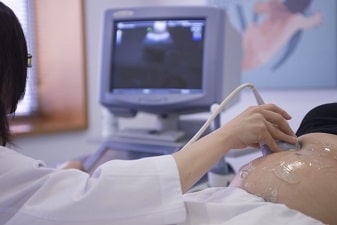
If the result of your blood pregnancy test is positive, a follow-up ultrasound scan is scheduled 20 days later to confirm the pregnancy. Once the pregnancy is confirmed and you have been discharged from your IVI clinic, you can begin your maternity care with your chosen provider.

IUI is a minimally invasive and practically painless procedure. The discomfort can be compared to that of a smear test. You may experience some cramping afterwards, but often what you feel is linked more to ovulation than to the insemination procedure itself. For those considering artificial insemination in London, this gentle approach to IUI in London offers a reassuring and comfortable experience.
It is normally recommended as a treatment for men with sub-optimal or diminished sperm quality. It can also be effective for single women and female same-sex couples. For those considering donor insemination, IUI in London offers a particularly suitable and accessible pathway within the wider fertility treatment journey. It is also a key option for individuals or couples exploring donor conception, where donor sperm may be used to help achieve pregnancy.
Intrauterine Insemination is a method recommended for couples when the following requirements are met:
For single women or female couples, IUI is also an effective treatment option using donor sperm. The requirements will be similar to male factors. A Specialist nurse consultation can help determine whether IUI in London is the most appropriate next step based on individual fertility needs.
The start of the treatment must coincide with the woman’s menstrual cycle. Once established, ovarian stimulation begins (if required). This lasts for approximately 10 days. Once the follicle reaches the right size, ovulation is induced using a trigger injection. The insemination procedure is scheduled 36 hours later. In total, the whole process takes about 12 days.
For those exploring artificial insemination in London, IUI provides a gentle and supportive treatment pathway. It is designed to work in harmony with the natural cycle to give the best possible chance of success. The overall health of the womb plays an important role in achieving optimal outcomes.
An ultrasound scan to confirm there are no structural issues with the uterus or the ovaries which could impact the treatment
A tubal patency test to ensure at least one fallopian tube is functional
Hormonal profile and full serological testing
A semen analysis to assess semen characteristics
Patients undergoing artificial insemination in London will typically undergo these evaluations at a licensed clinic offering IUI in London, ensuring all health and safety standards are met.
The insemination procedure is carried out at the clinic. It is an outpatient procedure that does not involve entering the operating theatre. Once the insemination has been performed, the woman can rest for 15-20 minutes although this has no impact on the chances of success. Once leaving the clinic, they can resume their day as normal.
The cost of Intrauterine Insemination treatment at IVI is £1,250.
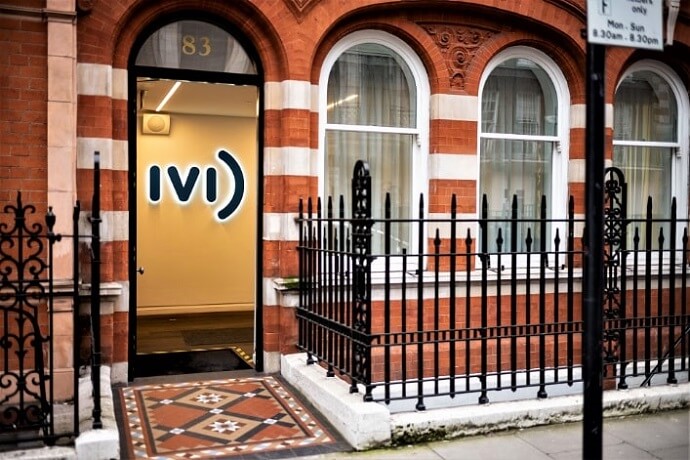

Located within a 10-minute walk from Oxford Circus, the IVI London clinic is a state-of-the-art facility offering a complete range of fertility treatments including IUI, IVF, ICSI and Egg Donation.
